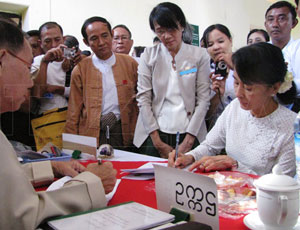It’s official – Aung San Suu Kyi has officially filed to run in the near-rural constituency of Kawhmu on the outskirts of Rangoon in the April 1 by-election. After filing papers to run on Wednesday, she was surrounded by hundreds of bystanders eager to get a glimpse of the 66-year-old democracy icon.

“Aung San Suu Kyi was the first member of the NLD to register. She's going to run for the lower house,” a senior party official, Win Htein, told Agence France-Presse.
Suu Kyi hinted this weekend that she could even take a position in the government, if asked, but said it “depends on the circumstances.”
AFP reported her saying, “It depends on the circumstances, and it depends (on) minister of what,” the Nobel laureate replied when asked whether she would accept a government post if offered one.
When a reporter suggested a post of foreign minister, she laughed, saying: “I will have to think very seriously about that.”
Some observers have speculated that she might be offered a position in health, education or the ethnic affairs area. In recognition of her image as Burma’s leading democracy advocate, a stream of top Western officials have beat a path to her home in Rangoon as soon as the arrive in the country.
Suu Kyi was held under house arrest for most of the past two decades, prior to her release in November 2010.
A top regime figure told AFP on Monday that Burma has “no other way” but to embrace democracy, and promised that the April poll would be democratic.
Her political party, the newly-reformed National League for Democracy, will seek seats in up to 48 constituencies throughout the country at various levels of government. The exact number and candidates has not been announced.
Debate is still swirling around Suu Kyi’s decision to run for Parliament, with some critics saying she may be neutralized in Parliament, when it’s seen that she is only one member of a small opposition group of lawmakers. Yet her move will be interpreted as endorsing the unfolding political process occurring in Burma, which has undergone a rapid number of political changes in the past year, including loosening of press laws, legalizing the right to demonstrate and organize as workers, the release of leading political prisoners, ethnic cease-fire agreements and the cancellation of unpopular giant development projects involving a hydropower dam and a coal-fired power plant.
Other observers say that in Parliament she may be better positioned to push for reforms to the 2008 Constitution, to organize a coordinated opposition movement of politicians and to push for a broad political discussion of ethnic issues which have festered for the past 60 years since Burma’s independence from Britain, preventing the country from enjoying peace and economic development in ethnic regions.
In December, Suu Kyi, responding to fear that her image and reputation would be lessened as a member of Parliament, said, “Some people worry about my reputation if I contest the by-elections. We shouldn't do politics for our reputation. We have to do what we think we should do. If I think I should, I will compete in the election.”



